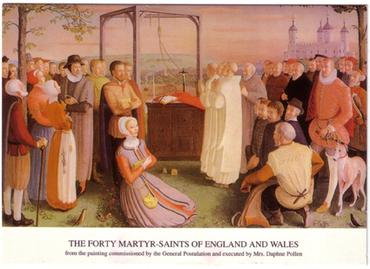 |
| Blessed Martyrs of Uganda, Pray for us to God! |
The Roman Catholic White Father missionaries had to walk the diplomatic tight rope as they say, since the King's favour shifted from one religious group or the other. This was a time before Christians had an appreciation of ecumenical principles and the Anglicans were often in competition with the Catholics and both Christian groups were in competition with Muslim missionaries.
After the death of Mutesa his son Mwanga ascended the Bugandan throne. While at first he was warm to the Christians, he later became hostile to them. Mwanga became sold to the idea that it was treasonous to give allegiance to the Christian God. An Anglican bishop James Hannington was consecrated as a missionary bishop for Equatorial Eastern Africa. When he went to the mission areas in Buganda, the King had him killed. The bishop is the Protomartyr of the Christian missions. His last words to his executioners are "Tell Mwanga that I have purchased the road to Buganda with my blood!"
However the King's sexual tastes included homosexual sex with the young pages in his court. The boys refused to bend to his will.
The chief steward at court Joseph Mukasa , who was a Catholic rebuked the King for the murder and for that he was also stabbed and burned to death as an example to all. He became the first of the Catholic martyrs. Mukasa was able to teach the boys the Christian teaching on homosexual acts and for the boys to resist and keep away from Mwanga's whims. Charles Lwanga took over him in looking after these boys.
One of the boys resisted Mwanga's advances and he too was martyred. Enraged, he ordered the execution of all his pages in court, all of whom are Christian, Anglican and Roman Catholic as well as catechumens.
The King gave the boys a choice whether to renounce their faith or not. Mwanga commanded all who pray (the Lord's Prayer) to his left and those who don't to his right. All the boys went to the left and they were led to the place of execution. They were bound with reeds and faggots and these were lit. The boys included the eldest Charles Lwanga and the youngest Kzito was only 14. While on the way they prayed the Lord's Prayer and recited their catechism, Anglicans and Roman Catholics, cheerful on the road to Eternal Life. It was Ascension Day.
Pope Paul VI canonized the Roman Catholic martyrs on 18 October 1964. However the Pope also recognized the martyrdom of the Anglican boys in his homily during the canonization Mass by saying
"And the others are worthy of mention also, who, professing the Anglican religious customs, were afflicted with death for the name of Christ."
The martyrdom of the Ugandan boys became the seed for the rapid growth of Christianity in Uganda. But it was the will of God that many yet will shed their blood for the Gospel in this land. In the 20th Century, the most notable of them was the Anglican Archbishop of Uganda, Janani Luwum,a staunch defender of human rights, who in 1977 was ordered killed by Idi Amin. It is said that as Abp Luwum was to say the Lord's Prayer, Amin enraged, shot him.
The Roman Catholic Church and the Anglican Communion commemorates the Martyrs on their feast day of June 3.
Oremus
O God, by whose providence the blood of the martyrs is the seed of the Church: Grant that we who remember before thee the blessed martyrs of Uganda, may, like them, be steadfast in our faith in Jesus Christ, to whom they gave obedience even unto death, and by their sacrifice brought forth a plentiful harvest; through Jesus Christ our Lord, who liveth and reigneth with thee and the Holy Spirit, one God, for ever and ever, AMEN.



